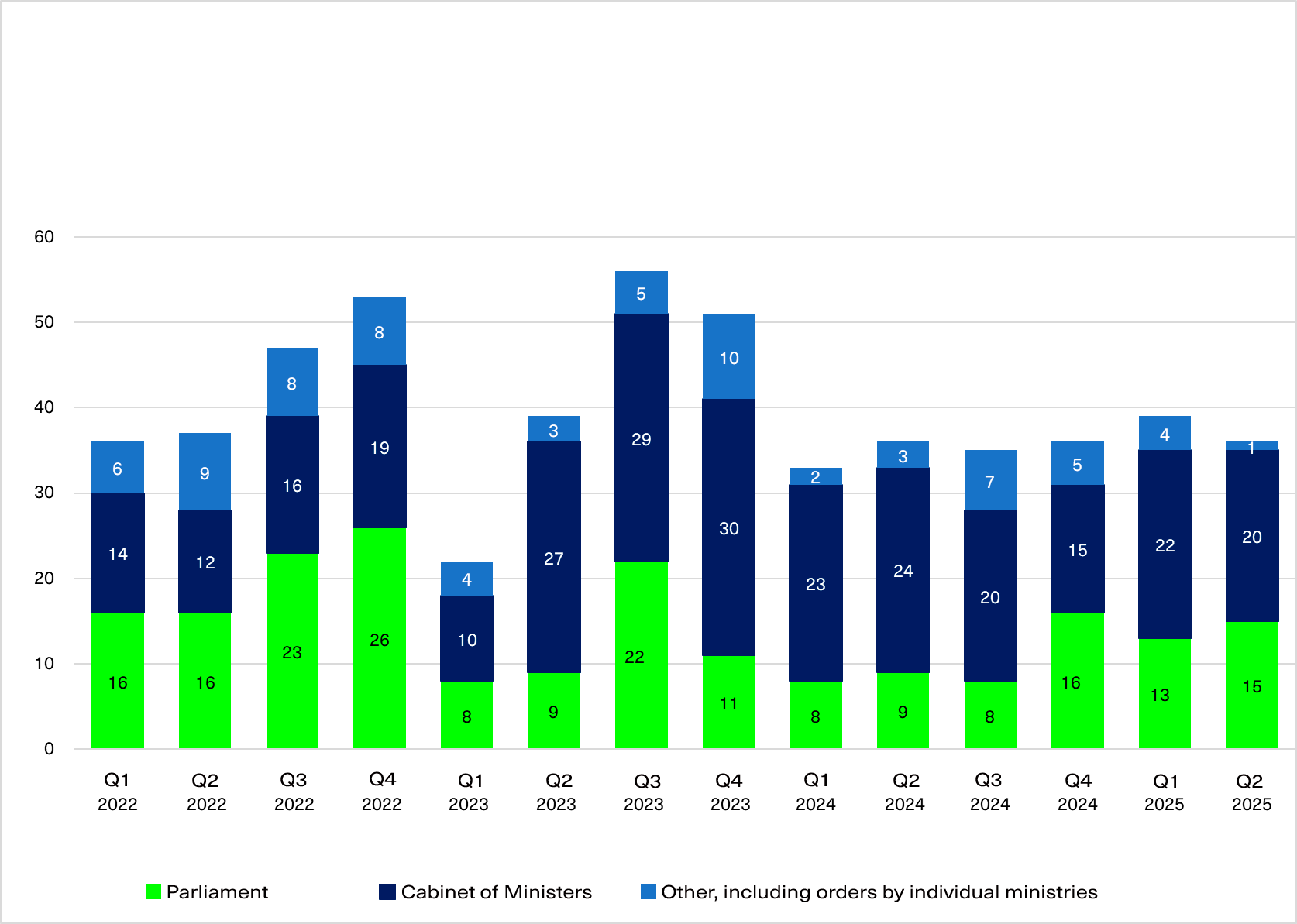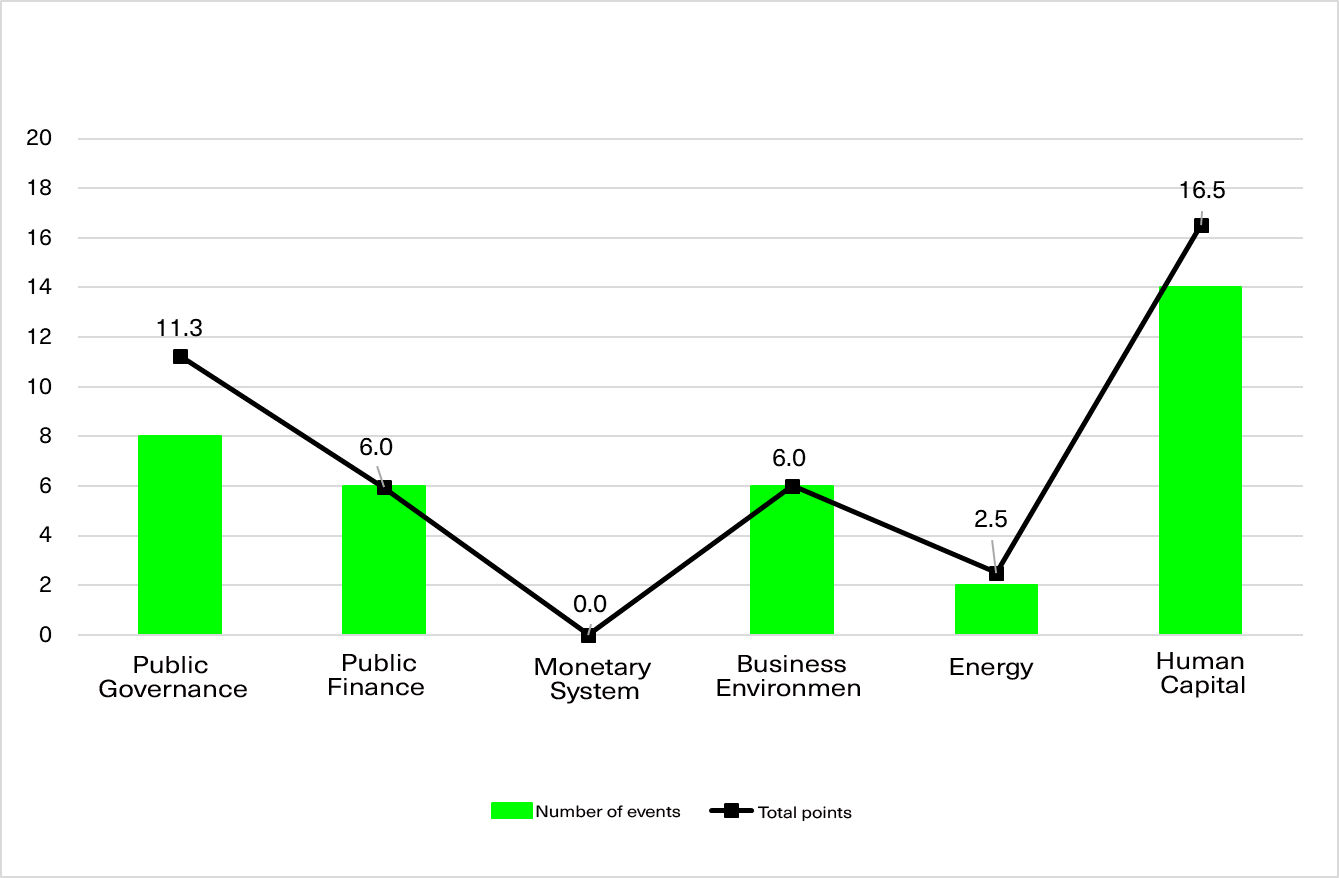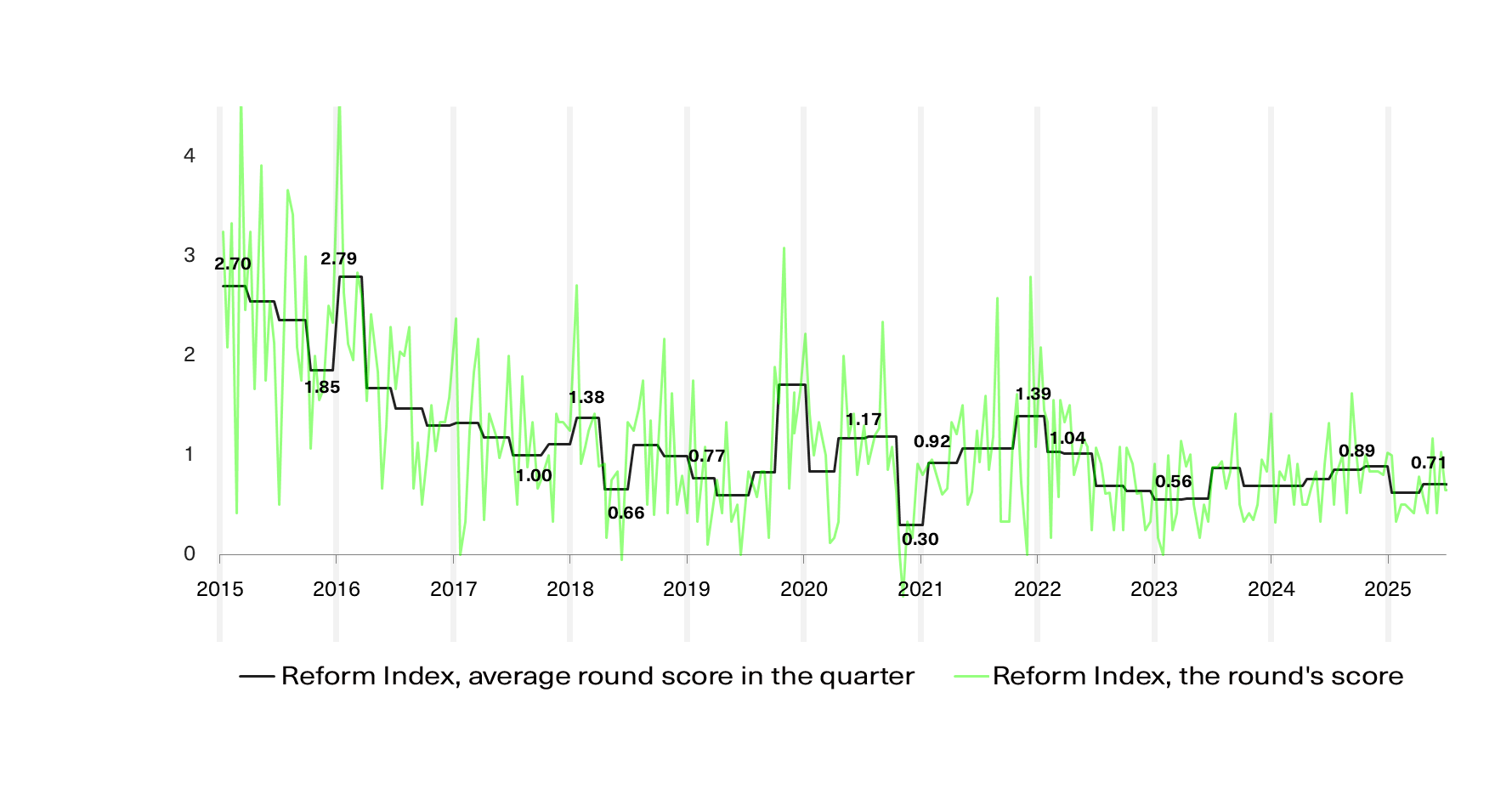In the second quarter, the anticipated acceleration of reforms required for EU accession by 2030 failed to materialize. Instead, Ukraine increasingly missed deadlines for structural benchmarks under IMF agreements and the Ukraine Facility program. The two-year trend persisted in which most reforms were initiated by the Cabinet of Ministers rather than Parliament. Alongside our findings on parliamentary voting, this indicates a decline in MPs’ capacity to work effectively.
Figure 1. Initiators of regulatory acts classified as reforms in the Reform Index

Since the beginning of 2024, the government has adopted 30–40 reforms per quarter. The second quarter of this year was no exception: we recorded 35 reforms and one anti-reform during this period.
The anti-reform was the law on strengthening the rights of bona fide purchasers (– 1 point). Although the law’s title does not hint at pitfalls, experts gave a negative assessment of its provisions restricting the state’s ability to reclaim property that left public ownership illegally. This also applies to natural assets such as forests, riverbanks, and lakeshores. Under the law, such property can be returned only if no more than 10 years have passed since its alienation. Moreover, if the statute of limitations (three years) has expired, then upon application by the new owner—the bona fide purchaser—the court must dismiss the claim without actually considering the case. In effect, the state will have only three years to file a claim for the unlawful loss of property.
A second important aspect is the change in the starting point for calculating this period. Previously, the term began on the date when the state learned of the illegal alienation, whereas it will now be counted from the date the property was transferred to the bona fide purchaser or from the date of state registration of ownership.
The relevance of the problem can be seen in a recent conflict in Kyiv, which arose when the RiverStone residential complex restricted access to a section of the Dnipro embankment. In August 2025, the Supreme Court ruled to open access. However, after the fence blocking the passage to the embankment was dismantled, a wall was built in its place with the support of RiverStone residents—effectively ignoring the Supreme Court’s decision. The wall was later torn down by municipal workers.
A third problematic aspect is that the state may reclaim such property through the courts only if it has the funds to buy it back from the bona fide purchaser. To demonstrate this, the state must deposit the property’s market value with the court before proceeding against the liable party. Andrii Shvadchak of TI Ukraine notes this is “an additional financial burden that can be especially significant for the budgets of small communities.” In practice, this restricts the number of claims they can pursue simultaneously.
Among the 35 positive changes, seven received the highest expert ratings—2 points or more on a scale from −5 to +5. These reforms concern deregulation, social protection, and several other areas.
The government adopted a resolution allowing work experience gained abroad to count toward age-based retirement eligibility (2.5 points). Previously, this was possible only with countries that had agreements with Ukraine on mutual recognition of work experience, but it now applies to all countries. However, the change affects only the calculation of total service length; when determining pension amounts, only contributions paid in Ukraine will be taken into account. This provision is particularly important now, as several million working-age Ukrainians are abroad due to the war, but there is hope they will return once hostilities end.
A significant milestone was the law enabling Ukraine to join the “Roam Like at Home” service (2 points). It stipulates that European operators are not required to obtain authorization in Ukraine if they do not provide services here and have no network of their own, but only use access to Ukrainian operators’ networks for roaming. The National Commission for the State Regulation of Electronic Communications, Radio Frequency Spectrum, and the Provision of Postal Services (NCEC) will be responsible for monitoring and ensuring the compatibility of European and Ukrainian operators, as well as assisting Ukrainians whose mobile service does not work in the EU. Also in the second quarter, the government approved requirements for digital wallets with electronic identification (eID) (1.25 points)— applications that allow users to store documents, ID data, and electronic signatures and use them online. The rules incorporate provisions of the European Digital Identity Regulation (eIDAS 2.0) and represent a preparatory step toward mutual recognition of electronic identification between Ukraine and the EU.
On July 14, 2025, the EU Council decided to include Ukraine in the EU roaming zone beginning January 1, 2026.
During the same period, the government approved a resolution on procedures for managing public investments (2 points). Although it was adopted back in February, it was only published in May. The resolution makes the process of state support for public investment projects more transparent. Such support can be granted only to projects included in the unified public investment portfolio. To be included, a project must undergo a preliminary feasibility study (for projects worth up to UAH 50 million) or a full feasibility study consisting of strategic, financial, managerial, and other assessments, be entered into the Unified Information System for Public Investment Project Management, and receive approval from local self-government bodies, the regional state administration, or the relevant ministry—depending on the project’s scale. Oleksandra Betliy (IER) notes that “there are several challenges that the government has already started to address. Among them are the insufficient capacity of local authorities and other actors to prepare high-quality investment projects, as well as a lack of understanding of the reform’s purpose. To overcome these problems, the government will train communities, explain the reform, and establish project preparation offices. At the same time, the capacity issue exists not only in communities but also in line ministries.”
As part of the civil service reform, a more transparent approach to remuneration was introduced (2 points). Salaries now consist of a fixed component (base pay, seniority allowance, and rank allowance) and a variable component—bonuses. The total annual bonus amount may not exceed 30% of the fixed component. The goal is to allow civil servants to better predict their income and become more independent from management, which previously could “buy loyalty” with high bonuses or, conversely, punish “inconvenient” employees by withholding them.
The second quarter also saw two deregulation measures, each receiving 2 points. First, the government abolished about 200 business regulations in the agricultural sector, the space industry, and healthcare through four resolutions. Examples of outdated rules included permits for reopening hair salons after renovations, approvals for guests to enter wellness facilities, authorizations for using stove heating in rural game halls, and similar requirements. The second major simplification was streamlining procedures for writing off military property. The law stipulates that unusable military property (excluding real estate) worth up to UAH 1.7 million can be written off with a single act, without approvals or authorizations from higher-level officials.
The social sphere was not overlooked either. The introduction of multidisciplinary teams and the expansion of support in social services received 2 points. Such teams will include social assistance specialists, rehabilitation specialists, a psychologist, a doctor, and a teacher, with other professionals involved as needed. The team will develop an individual plan for providing social services to beneficiaries, monitor its implementation, and adjust it when necessary. Additional opportunities for physical support were also introduced: whereas this service was previously available only to people with disabilities affecting vision or the musculoskeletal system, it now extends to all individuals with such impairments, as well as those with intellectual, sensory, mental, or behavioral disorders. The law also broadens financing options for social services. At present, they are funded solely from community budgets. By the end of the year, however, social institutions and facilities are to be transformed into state or municipal nonprofit enterprises. Under this model, they will be able to provide paid services, attract funding from the state budget, receive grants, and use other means of financing social services.
All expert assessments of regulatory acts from the Reform Index are available here.
Progress by Reform Index areas
In the second quarter of 2025, we recorded the greatest progress in two areas—Human Capital and Governance, which accounted for 14 and 8 changes, respectively. Six developments took place in Public Finance and Business Environment, and two in Energy: a plan to address the crisis in the oil and petroleum products market, and the launch of transferring natural gas consumption data to a unified information database. No changes occurred in Monetary System in the second quarter of 2025 (Figure 2).
Figure 2. Total event scores by area, Q2 2025

Source: Issues 262–267 of the Reform Index
Human Capital
Of the 14 reforms in this area, two—the recognition of work experience gained abroad and the creation of multidisciplinary social support teams—were described above among the top reforms of the quarter, while all the others received 1 point each from experts. Seven reforms in this area were initiated by Parliament and another seven by the Cabinet of Ministers.
Among the notable changes is the law promoting student volunteering and securing volunteers’ right to have their competencies recognized. However, it does not regulate the rules for children’s participation in volunteering. As Nataliia Povtar, a lawyer at the Center for Democracy and Rule of Law, explains, “current legislation allows involvement in volunteer activities only from the age of 14 with parental consent. This situation is not consistent with international standards, particularly the Universal Declaration on Volunteering, and it also contradicts national youth policy, which recognizes the possibility of civic participation (in children’s civic organizations) from the age of 6.“
The law establishing the Unified Qualifications Register—the Classifier of Professions, which will merge the current Qualifications Register, the National Classifier of Professions, and the Handbook of Qualification Characteristics of Workers’ Professions—also abolishes the requirement for enterprises to submit vacancy information to the State Employment Center.
The government prepared a resolution establishing correspondence between educational levels and the National Qualifications Framework. Primary education (grades 1–4) is expected to provide basic general knowledge, an understanding of simple concepts about oneself and the environment, and the foundations of safe behavior (Level 1 of the framework). Basic secondary education (grades 5–9) should provide basic empirical knowledge, an understanding of core processes, the ability to solve everyday problems, and the ability to articulate one’s opinion (Level 2). Specialized secondary education (grades 9–11/12) will correspond to Qualification Levels 3–4 and should provide an understanding of principles and processes as well as skills for solving tasks in learning and professional activity.
A number of changes took place in social protection. The government simplified the rules for obtaining subsidies for large foster families. They can now qualify for assistance even if they have recently purchased a car, housing, or land. In addition, subsidies will not be withdrawn if a child placed in a foster family or a family-type children’s home has more than UAH 100,000 on deposit. Parliament also adopted a law prohibiting the adoption of children by people with mental illnesses or by those convicted of domestic violence or crimes against national security.
For manufacturers of generics—equivalents of original medicines—Ukraine began implementing the “Bolar rule,” which allows preparations for their sale, including conducting research, obtaining licenses, and producing medicines, even before the original patent expires. However, generics cannot be advertised during this period (violating this restriction will result in the cancellation of state registration of the medicinal product). If a manufacturer sells the medicine before the original drug’s patent expires, it will face a fine of 100–500% of the income received.
Public Governance
Eight changes took place in this area in the second quarter: four from Parliament, three from the Cabinet of Ministers, and one more—the rules for rotating customs officers—adopted by order of the Ministry of Finance. The top reforms included the new rules for calculating civil servants’ salaries, streamlining procedures for writing off military property, and the resolution on requirements for digital wallets mentioned at the beginning of the article.
The above-mentioned procedure for rotating customs officers (+1.5 points) is part of anti-corruption efforts. The idea is that rotations will prevent the formation of “closed groups” of customs officers linked by informal ties. However, Vitalii Nabok of the Institute for Analytics and Advocacy points to two weaknesses in this approach. First, rotations will be carried out only with the employee’s consent, which must be recorded in the employment contract. Currently, the order does not provide compensation for customs officers relocating to a new post, so few are likely to agree to rotation. Second, the decision on rotation is made by the head of the State Customs Service independently or at the request of the head of an independent structural unit. Thus, if a higher-level manager is involved in corrupt schemes, he is unlikely to rotate the customs officers assisting him.
In June, the President signed a law simplifying procedures for cooperation between territorial communities (1 point). In particular, extending the term of a cooperation agreement will no longer require additional public consultations, and financing of measures agreed upon by partners may begin in the current budget period (previously—from the next one). To ensure accountability and transparency, meetings of the commissions preparing cooperation agreements will be video recorded and published on the websites of participating communities. The Ministry for Communities and Territories Development will collect information quarterly on concluded agreements and the communities involved in cooperation.
MPs initiated and adopted a law that closes the loophole for seizing state and municipal property through “inseparable improvements” to leased property (1.5 points).
Inseparable improvements are modifications to leased property (repairs, extensions, and the like) made with the owner’s consent that increase the property’s market value and cannot be removed without loss of value.
Instead of the right to purchase such property directly, tenants were granted a preferential right to buy it at auction for the highest offered price. A one-year transition period after the law’s adoption will allow tenants who received permission to carry out inseparable improvements and began the purchase process to complete their transactions.
Figure 3. Average quarterly Reform Index score

Source: Issues 1–267 of the Reform Index
Overall, in the second quarter of 2025, compared to the previous quarter:
- The number of reforms fell slightly—from 39 to 36;
- The average round score rose somewhat but still remains very low—from 0.6 to 0.7 points on a scale from −5 to +5;
- The average score per event increased from 1.1 to 1.2 points.
Photo: depositphotos.com/ua
Attention
The author doesn`t work for, consult to, own shares in or receive funding from any company or organization that would benefit from this article, and have no relevant affiliations



